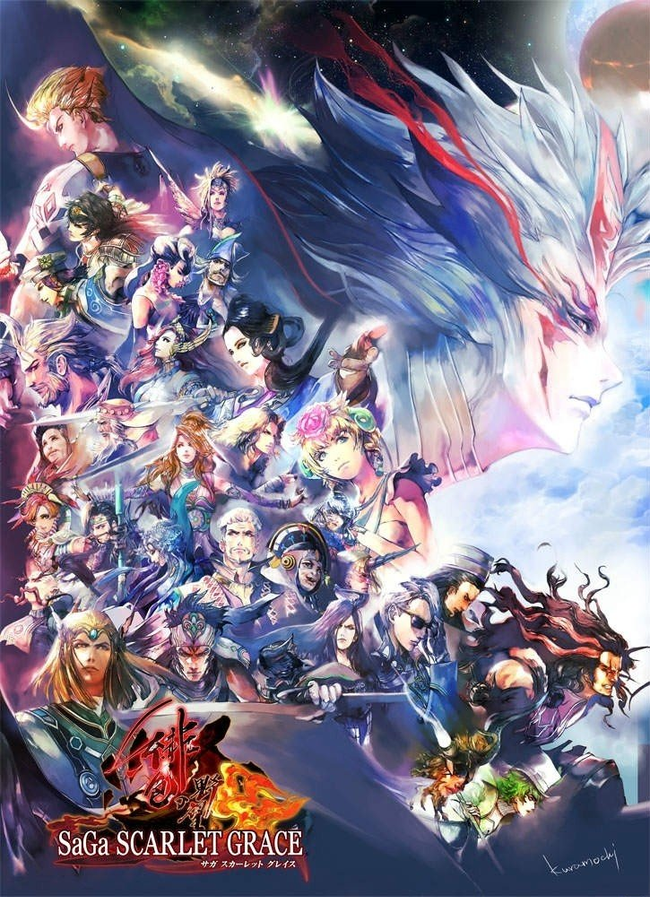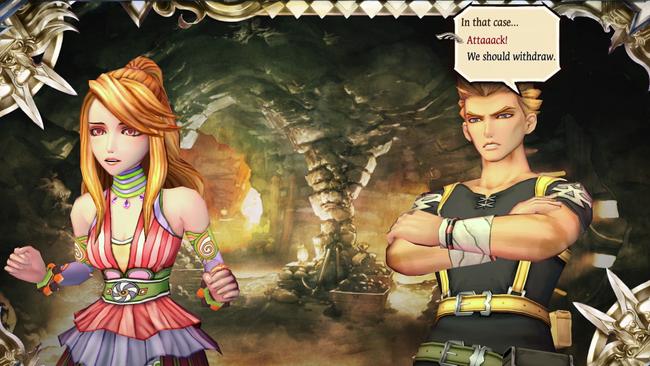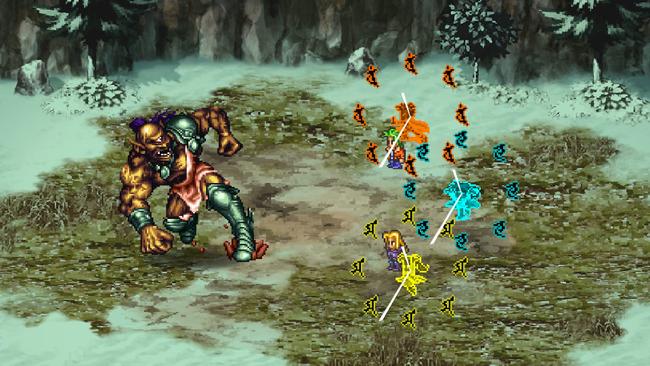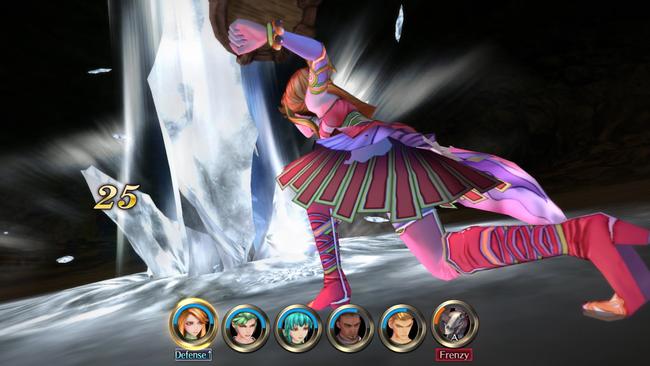
SaGa Series Interview at E3 2019: We chat with Akitoshi Kawazu and other SaGa leads about Scarlet Grace, localization, and more
One of the reveals this E3 that I was most excited about was the official localization announcement for both SaGa Scarlet Grace: Ambitions and a remaster of Romancing SaGa 3. While plans for an English release of these titles had been public for a while, this was the first time Square Enix officially confirmed a Western version of the two games, and it was great to see them in the E3 presentation.
SaGa Scarlet Grace originally released in in 2016 for Japan as a PlayStation Vita title, but it saw an enhanced re-release in 2018 as SaGa Scarlet Grace: Ambitions, which is the version announced for the West. Similarly, Romancing SaGa 3 originally released as a Super Famicom title in Japan back in 1995, and this upcoming remastered version will be the first official English release of the game. Check out the announcement post for more information, the E3 trailer, and screenshots.
In Los Angeles during E3, I got a chance to speak, through a company translator, with three Square Enix leads of the SaGa series: Akitoshi Kawazu - the series' creator, series' designer, and writer for SaGa Scarlet Grace; Masanori Ichikawa - the producer SaGa Scarlet Grace; and Kazuyuki Shindo - the SaGa team lead handling overseas direction for SaGa Scarlet Grace: Ambitions.
You can check out my discussion with these three below, where we talk a little bit about the games themselves and the series as a whole:

RPG Site: You announced two different SaGa games this week - SaGa Scarlet Grace: Ambitions and the remaster of Romancing SaGa 3. How and when was the decision made to localize both of these games into English?
Ichikawa: For a while, the SaGa series was not releasing new titles and it was stalling a bit. But throughout all of that, there were always players of the series of games, in Japan, asking for another SaGa game. So it was decided to bring back the series in 2016 with the re-release of Romancing SaGa 2 on iOS and Android worldwide, which expanded in 2017 for more consoles like PlayStation 4, Xbox One, Switch, and Steam. Through all of that, we had good responses from users across the world. That was a nice push for us to go ahead with the other titles too. And so I made a decision to hopefully works towards releasing upcoming of the titles in the franchise overseas as well.
RPG Site: Just to clarify, so when SaGa Scarlet Grace was originally conceived and released in Japan in 2016, was there always a plan to localize it into English at that point, or was that a decision that came afterward?
Kawazu: So when SaGa Scarlet Grace came out, it implemented a very unique and different game system. We wanted to make sure it was received well within the Japanese community first. We always had a vision of wanting to release the game worldwide, but the green light for an English release came after seeing Japanese player reviews, feedback, and making sure it was received well.
RPG Site: It seems like that feedback also led to the re-release of SaGa Scarlet Grace on new platforms too?
Shindo: Yes, and we decided that Ambitions was the version we wanted to release worldwide. However, Ambitions does have several new elements and a lot of new content added to the game, so it was difficult to release an English version at the same time as in Japan. We are taking all details into consideration making sure the localization is very precise and of good quality, and that's why it's taken some time.

RPG Site: As I understand it, SaGa Scarlet Grace is an RPG that doesn't have dungeons and it doesn't have explorable towns, focusing instead on overworld exploration and battles. So, what was the idea behind using a structure like that, being so different from most RPGs?
Kawazu: SaGa Scarlet Grace was the first proper entry in the SaGa series after several dormant years, so it was good timing for me to go back to the essence of RPGs and look at what the fundamental & essential elements are for what makes up an RPG. So, I came to the conclusion that it wasn't necessary to have dungeons or towns, as I wanted to focus on the role-playing elements. So, I wanted to focus on battles and on the storyline and go back to what is fundamental and essential for RPGs.
RPG Site: So, how important to you is the story or narrative of an RPG, and how do you implement that into a game? How does SaGa approach this?
Kawazu: So definitely, for a storyline, it's important to make sure that players can vicariously experience what the characters themselves are experiencing in the game. So, this means making sure players can sometimes sympathize with the characters, sometimes observe a character from a more objective point of view, sometimes overlapping yourself with the emotion that the characters are having, and sometimes engaging yourself in different points of view with the characters, so you are experiencing what the characters are going through. These are the sorts of things I try to implement into a storyline.

RPG Site: So, I understand you are not the localization team, but is there anything about SaGa specifically, compared to other Japanese RPG series, that makes it more challenging to localize into other languages? What are those challenges?
Shindo: (laughs) Mr. Kawazu definitely has a very unique style of writing when it comes to scenarios. Also, some of Mr. Kawazu's phrasing and choice of words can be very unique, so we have been working very closely with the localization team to make sure that they get the right nuance, the right intentions across to the West as well. So, when players in the West get to play these games, we want them to get the essence of Mr. Kawazu's writing.
RPG Site: So SaGa Scarlet Grace is a game that I personally have been interested to play for a while, but many in the West might not be familiar with the game or SaGa series. So, how would you describe the game - SaGa Scarlet Grace specifically - to someone who might be familiar with RPGs but not familiar with SaGa or this game?
Kawazu: So one main point is that there are multiple protagonists that the player can choose from at the beginning of the game. Each of these protagonists has their own individual stories, and these stories branch out into different directions. How these character storylines and events weave and progress depend on the protagonist you choose, that is something that separates Scarlet Grace from other RPGs. You get to experience a SaGa world from different viewpoints; to see a vast world that's out there. In that sense, it emphasizes the world that the players are experiencing.
RPG Site: So more generally: What makes a SaGa game, a SaGa game? What would you say is the series' defining characteristic?
Kawazu: (laughs) So I get this asked a lot, both for SaGa and Final Fantasy. One thing for the SaGa series, I always try to implement new gameplay systems in each title. Not just new stories or new characters, but a new game experience that the players can enjoy - something experimental that will 'wow' or impress as something new in game design.

RPG Site: That actually brings me to my next question, which is admittedly a little bit blunt. I'm not sure if this is the case in Japan as well but in the West, SaGa games can have the reputation of being sort of 'weird' or 'confusing' or 'strange' in how they play or tricky to figure out. I personally find that a bit endearing, but, is that something you intentionally try to craft within these games?
Kawazu: (laughs) So the perception that SaGa games are kind of difficult and confusing is also the case in Japan as well. But even then, we have outspoken fans that support the series and enjoy that aspect of the series, and we think that would be the same in the West, too. In regards to 'how difficult' we make the games, that's always something I have trouble balancing the right way. But there are two directions I like to consider. Sometimes a player might stop playing a game because they find it too difficult. But in other cases, players might find a game too simple and stop playing out of boredom. I would rather lean towards the former, where players are more likely to quit because they find a game too difficult rather than quit because a game is too simple. That's always the tone and direction that I tend to go with. But balancing the right challenge, difficulty, and doing something experimental is something I always work towards.
RPG Site: I know this is something you probably cannot answer here, but I have to ask: Can you offer any more details on when we in the West might be able to play either of these games? The trailer just said "coming soon".
Ichikawa: So QA for the games is currently ongoing and release timing is still being decided for the two titles. We, unfortunately, don't have a more specific answer for you, but we are in the process of QA. Development is going smoothly and hopefully, you will be able to play these games soon.
RPG Site: Thank you for your time.